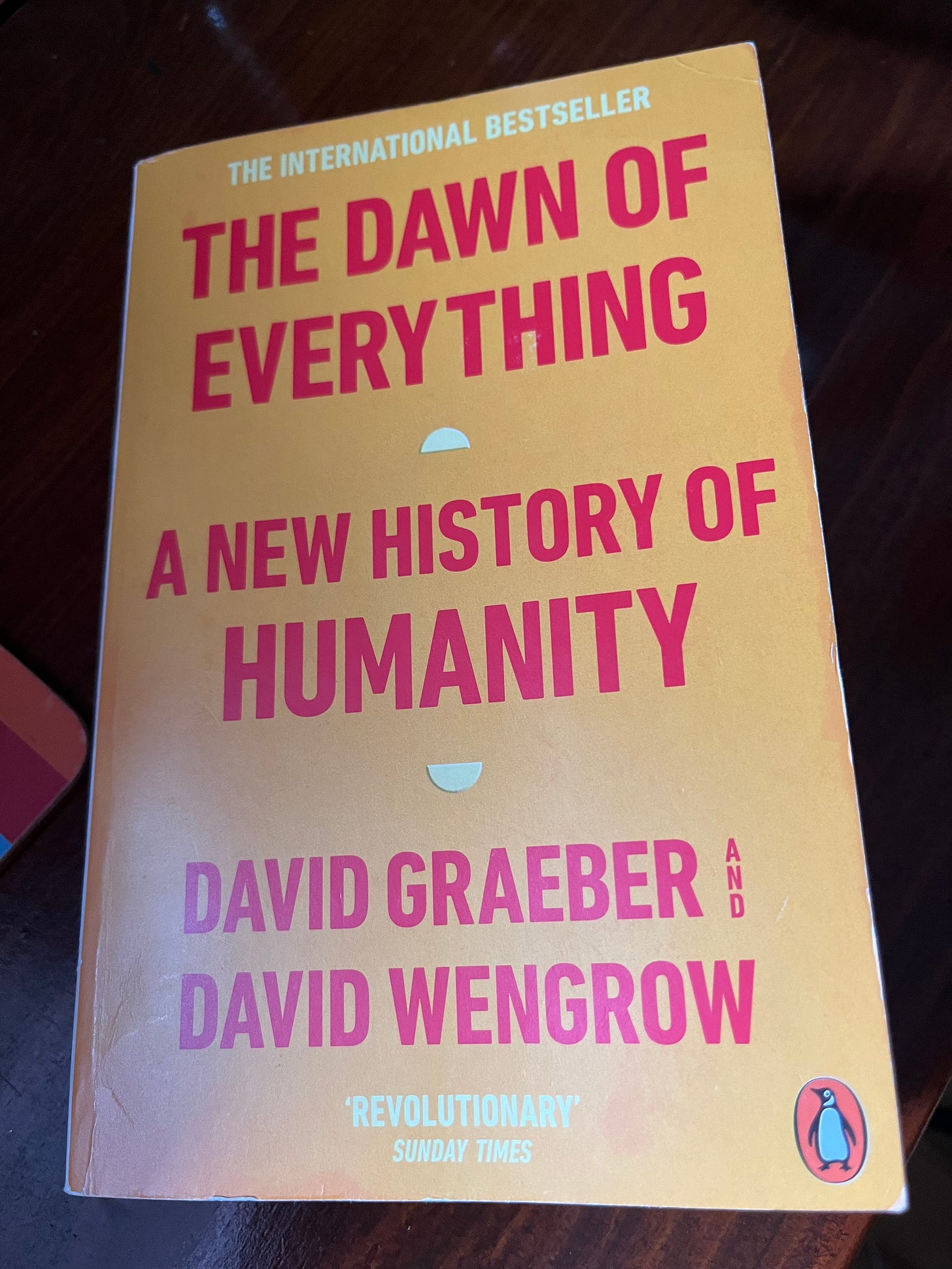If all this stuff is worthless, mind if we just take it?
How 21st Century tech is doing the old colonial grift all over again.
I’ve been really enjoying David Graeber and David Wengrow’s book ‘The Dawn of Everything’, a fascinating and energetic questioning of the ‘inevitability’ of modern civilisation, with all its inbuilt unfairness and hierarchies. How did we get here? Did it have to be this way?
You can feel the pair’s giggly excitement at delivering heresy after heresy, and then backing it up, cos they know their anthropological onions. It’s a counterblast to a lot of the stuff we learned at school, which turns out to be a borrowing of a borrowing of a borrowing of Victorian and Imperial certainties about the order of things, and how It Must Always Be This Way. It’s kind of the polar opposite of one of Lawrence Du Garde Peach’s Ladybird Books about the inevitable stately procession of old English kings, and is just as zippy and energising a read. Thanks to everyone who said it might be up my alley. It’s fun.
Their point could be boiled down to asking why, when the first person stood up amongst their little tribe of hunter-gatherers, and declared themselves king, the rest of us didn’t just laugh at them and tell them to piss off. Take that silly crown off, Terry, and make yourself useful. There are berries to pick. As a professional court jester, I like its choice of target and the way it swings its bladder-on-a-stick. It’s extremely Cunk, in fact. Which is lovely.
They begin by looking at what happened when representatives of hierarchical societies from Western Europe, usually explorers, bumped into indigenous communities of great sophistication and age, who didn’t run things in the same way. These were longstanding, civilised, sometimes even urban, arrangements of humans, but they didn’t necessarily have people at the top, or fret about possessions and ownership, and wealth. And they seemed to be able to get along fine, without really fundamental-seeming ideas, such as competition and scarcity and codified ownership.
There was the possibility for Europeans to learn from these people. And that was certainly how some intellectuals reacted. But there was also the chance to rip them off. And that’s what, eventually, tended to happen.
One part jumped out at me. Here’s the passage (edited slightly for emphasis), about how colonial visitors mistook complex communities with different ideas of ownership for total mugs, and then ran with that idea. What happened next? Yeah. All that.
“… indigenous critics of European civilization were already arguing that hunter-gatherers were really better off than other people because they could obtain the things they wanted and needed so easily. Such views can be found as early as the sixteenth century (..) insisting 'the Savages of Canada, notwithstanding their Poverty, are richer than you, among whom all sorts of crimes are committed upon the score of Mine and Thine.'
As we've seen, indigenous critics (…) caught in the rhetorical moment, would frequently overstate their case, even playing along with the idea that they were blissful, innocent children of nature. They did this in order to expose what they considered the bizarre perversions of the European lifestyle. The irony is that, in doing so, they often played into the hands of those who argued that – being blissful and innocent children of nature - they also had no natural rights to their land.
(…) Colonial appropriation of indigenous lands often began with some blanket assertion that foraging peoples really were living in a State of Nature - which meant that they were deemed to be part of the land but had no legal claims to own it. The entire basis for dispossession, in turn, was premised on the idea that the current inhabitants of those lands weren't really working.
The argument goes back to John Locke's Second Treatise of Government (1690), in which he argued that property rights are necessarily derived from labour. In working the land, one 'mixes one's labour' with it; in this way it becomes, in a sense, an extension of oneself. Lazy natives, according to Locke's disciples, didn't do that. They were not, Lockeans claimed, 'improving landlords' but simply made use of the land to satisfy their basic needs with the minimum of effort.
James Tully, an authority on indigenous rights, spells out the historical implications: land used for hunting and gathering was considered vacant, and 'if the Aboriginal peoples attempt to subject the Europeans to their laws and customs or to defend the territories that they have mistakenly believed to be their property for thousands of years, then it is they who violate natural law and may be punished or "destroyed" like savage beasts.'
In a similar way, the stereotype of the carefree, lazy native, coasting through a life free from material ambition, was deployed by thousands of European conquerors, plantation overseers and colonial officials in Asia, of bureaucratic Africa, Latin America and Oceania as a pretext for the use of bureaucratic terror to force local people into work: everything from outright enslavement to punitive tax regimes, corvée labour and debt peonage.”
Capitalism here has found some people who do not price their land, or their work, and decided that this work and land is therefore free. So they can take it. And then put a price on it themselves, trade it, profit from it.
Because otherwise, it’s just going to waste.
What shocked me, was realising that this is what 21st Century technological capitalism has done to the work of people who maybe don’t quite know how to put a monetary value on their labour and property either: artists and creators.
The creative arts have been colonised.
It’s what Spotify is, hardly paying any musicians in the long tail properly, piping profits to their CEO and the labels at the top. It’s what ‘buy-out’ contracts for TV shows are, now the default arrangement for most streaming services. It’s what stopping paying royalties is, or negotiating swingeing deals for the actual writers of things. It’s what writing any work with no authorial back end is. It’s what running a digital TV channel that doesn’t pay residuals on old content is, and the removal of repeat fees for distribution platforms that depend on repeats. It’s what naked IP grabs are. It’s what YouTube hoovering up existing broadcast content and acting as a middleman to collect ad revenue on it is.
More than that. It’s what not paying for creatives to attend meetings is. It’s what not paying development money is. It’s not paying for creators as equal (or to be more honest, senior) partners in any creative process.
It’s declaring that creative work is unpriced by people who just write, and draw, and make music, and act, and enjoy doing so. That we’ll do it anyway. That we are children of nature. Blissfully unaware of the value of our work. And so that work is therefore easy to declare valueless.
But, if surrendered to the people with enough modern know-how, this worthless property can be transmuted by some arcane business alchemy into millions of dollars. But you do need the tech equivalent of an imperial coloniser to do that magic. Hand over your stuff, Paints-With-Wolves, you’ll only spunk the money on feathers. You’re just making this stuff anyway. It’s just lying around on the ground.
It’s not new. It’s what work-for-hire is. It’s what corporations in the 20th Century did to comic book artists, leaning over the bullpen to see what Steve and Jack and Stan were doodling, telling them they were salarymen for a handful of beads, then taking their IP and turning it into lunchboxes and movies and not paying a cent back to the geniuses who decided a spider-man shouldn’t have four extra floppy stuffed sock legs.
Most of all it’s what AI data harvesting is. It’s what LLM datasets are. It’s what taking your photos off Facebook to train bots on is. It’s what Google books grabbing copyrighted material without asking is, in order to build the biggest stolen library in history. It’s what the whole creative ecosystem is now: a colonised space.
It’s because we make art anyway. We like doing it. And the assumption - not entirely incorrect - is that we’ll do all this creative stuff whether you pay us or not. We’re in some naive, different, less money-oriented society of creative commonwealth, a blissful unspoilt primitive wilderness of ideas and colours and melody, and so we forget that it all has value. Partly because they keep telling us (and paying us) as if it is worthless.
Here’s Mark Zuckerberg, not wearing his new twat-goggles (but he might as well be in a solar topee and bristling moustache), explaining the system, stupid.
“Meta CEO Mark Zuckerberg says there are complex copyright questions around scraping data to train AI models, but he suggests the individual work of most creators isn’t valuable enough for it to matter…”
He’s confident of this. It’s how they’ve set it up. If our stuff hasn’t got a price tag on it - or at least not one that is big enough for a zillionaire to notice - then imperial forces, bigger than any nation state, are just going to take it. If your drawing only nets you £50 that pays your gas bill, then it’s not really work, and it’s not really property at all.
Not until he or one of his mates nicks it off us. And then - oh yeah - it’s gold. Or bauxite. Or sugar. Or ideas. Or tunes. Or art. And someone’s going to be rich, rich, rich.
Just not us.
We don’t really understand money, like the tech-colonisers. We’ve got feathers in our hair, and ink on our fingers. We sing tra la la. We make up stories. We’re just hippies.
Apparently we’re idiots. So they can take it all.









This is so very spot on, Joel